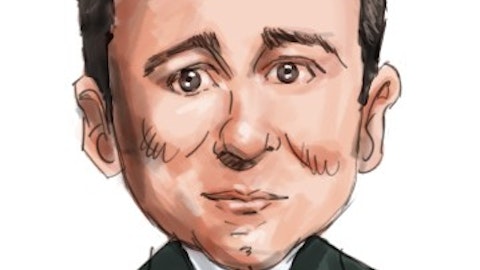Nik Priebe: Yeah, thanks. Just a quick question on the Clarios EBITDA contribution in the quarter. It looks like it was up by healthy magnitude sequentially and year-over-year. Was there anything one-time in nature there? Any add-on acquisitions contributing? Or is that just purely a product of organic growth in that business? I just want to drill into that headline earnings figure a little bit.
Denis Turcotte: Yeah. That’s fundamentally organic growth, and it ends up being a fairly strong quarter for us. There is some [technical difficulty]
Nik Priebe: Got it. Okay, that’s good. And then just a point of clarification on the Everise sale. Just wondering if you could provide a little bit of color on why in that situation you opted to sell a portion of the business as opposed to a full sale?
Cyrus Madon: Well, look, we had a party that was very interested in the business, and we considered all the alternatives available to us, and we thought we could take our money off the table and then some we actually are going to realize twice the capital we invested, and we still get to ride half the upside on the business. So we just thought from a capital allocation and risk management perspective, it’s a very good outcome. And obviously, it’s a very healthy, very strong return for us in a short period of time, and we continue to be able to participate in the upside in the business.
Nik Priebe: Yeah. Okay. And then one quick follow-on. Just the partial sale, I think you referenced the 3.5 times MOC, but in the note, the letter to shareholders, I think there was a reference to proceeds equivalent to 2 times the initial capital investment. Is the difference between the 3.5 and the 2 times multiples just reflect the fact that it’s a partial sale?
Jaspreet Dehl: Yeah. It’s just – that’s exactly right. So on a cash basis, we’ll have kind of 2 times the initial equity that we put in back out. And then the unrealized value of the 17% that we continue to hold makes up the difference from the 2 times to the 3.5 times
Nik Priebe: I got it. Okay, that makes sense. I’ll pass the line. Thank you.
Operator: Thank you. [Operator Instructions] And our next question comes from the line of Jaeme Gloyn with National Bank.
Jaeme Gloyn: Yeah, thanks. Just wanted to get a little bit more color on the use of the proceeds from the Westinghouse and half going to the BAM preferred half going to corporate. What’s – I guess, maybe what’s the BAM perspective here on taking in half of that exposure? Are there changes in how they’re thinking about financing the BBU investment here at the preferred level? Maybe a little bit more color as to how that decision came about?
Cyrus Madon: Yeah. Well, this is Cyrus. And why don’t I start and Jaspreet can add on any comments if she has any. But look, BAM and Brookfield Corp. to be specific, is – are very supportive of BBU. We needed capital to continue growing at a point in time where we saw some incredible opportunities but didn’t have the long-term capital in place. And so, what they agreed to do was subscribe for these preferred shares, which only came due on the sale of one of our businesses. So if we didn’t sell anything, we didn’t have a maturity wall in front of us. So, extremely favorable from a BBU perspective. Given the sale of Westinghouse now, contractually, BAM, and obviously, Brookfield Corp. has the right now to be fully redeemed out of it. But in order to provide BBU with continued capital flexibility and liquidity to do other things, what they’ve agreed is to retain half of it, half of it effectively repaid. So that’s where we’ve landed.
Jaeme Gloyn: And is the view that on a potential attractive acquisition, they stand ready to re-advance that amount? Or did the total capacity shrink with this repayment?
Cyrus Madon: Well, look, I would put it this way that Brookfield Corp. is a very supportive shareholder. And I don’t think that’s going to change. Our objective at BBU is to have it stand on its own two feet over time. I think that’s better for all sorts of reasons and everybody. But Brookfield Corp. will be a very supportive shareholder.




